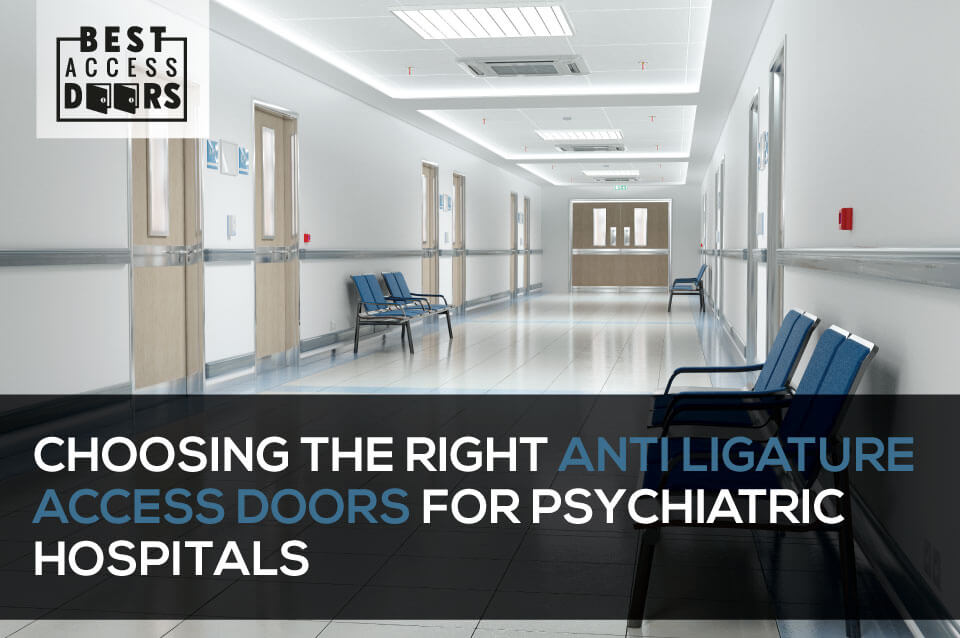Choosing the Right Anti Ligature Access Doors for Psychiatric Hospitals
Posted by Best Access Doors on 2nd Feb 2022
Healthcare facilities across the U.S. have dealt with a sharp increase in mental health-related concerns in recent years. It is suggested that mental illness and substance abuse are the leading cause of the rise — resulting in 1 out of every eight emergency department visits.
The agency also reports that mental disorders are now considered the most common cause of hospitalization for all people in America under 45. Since many hospitals are not built to accommodate this growing number of behavioral-related emergency concerns, patients may not be treated carefully, safely, and securely. When faced with a behavioral emergency or non-emergency situation, conducting research goes a long way.
Here are some helpful keywords you can use to find the best psychiatric hospitals in your area:
- psychiatric hospitals near me
- list of psychiatric hospitals
- inpatient psychiatric hospital
- best adolescent psychiatric hospitals
- inpatient psychiatric hospitals near me
- best private psychiatric hospitals
There are also instances where hospitals and healthcare facilities are overcrowded and have limited resources and staff. It can be challenging since most facilities lack anti-ligature access doors and safe examination rooms. It would be highly beneficial if healthcare facilities developed interchangeable spaces to meet the needs of patients.
Risk Control
When planning the construction or renovation of space within a mental institution or any facility that occupies vulnerable individuals, safety measures must be put in place to reduce ligature risks. While this can be challenging for designers, completely removing ligature risks is not an option since it can hinder the staff from carrying out necessary tasks and remove the patient’s rights of independence.
There are several considerations for mitigating the risk of injury and self-harm in ligature-resistant environments. Underlying conditions that may contribute to self-harm, aggression, and escape attempts include:
- Access to high-risk areas (e.g., roof, balcony, porch, window)
- Uncontrolled egress;
- Poor exterior/interior visibility/accessibility to patient-occupied areas;
- Unauthorized access to staff (e.g., team stations) or high-risk areas (e.g., environmental service supplies);
- A lack of secure holding (i.e., emergency departments, unit seclusion);
- Unsafe finishes or design elements (e.g., toxic or flammable elements);
- Furnishings and furniture that can be used for barricades, suicide, projectiles, or entrapment;
- Access to ligature (hanging) points (e.g., plumbing fixtures, mechanical (HVAC) systems, electrical fixtures, outlets, doors); and
- Other issues that may contribute to adverse patient perceptions (e.g., institutional lighting, colors, signage)
These conditions can be effectively reduced by carefully considering the facility’s interior and layout. These include building components such as plumbing systems and utilities and technological advancements that address environmental conditions such as security and ligature resistance. Here are other examples of ligature anchor points:
- Site: Trees, fencing, gazebos, covered walkways, gutters, and downspouts
- Building structure: False ceilings, maintenance access hatches/panel
- Doors: Hinges, handles
- Ceilings: Suspended ceilings, lights, air vents and diffusers, smoke detectors, extractor grilles
- Curtain tracks
- Windows: Handles, opening restrictors, locks
- Pipes
- Wall-mounted devices: Alarm panels/bells/pulls, soap dispensers, paper towel dispensers, shelves, coat hooks, pictures and paintings, mirrors, cabinets, hold back/hold-open devices, wall-mounted TVs, sconces, rails/grab bars
- Beds
- Closet shelving, coat hooks, hangers, clothing racks
Designing a facility for behavioral and mental health patients is complex due to the required balance for safety from self and others with the need for comfort, privacy, and socialization.
Importance of Anti-Ligature Doors and Equipment
Creating a ligature-resistant environment is critical in ensuring the patient’s safety inside healthcare facilities. It requires a holistic approach that considers all potential hazards. Manufacturers must design anti-ligature door hardware, anti-ligature cabinet hardware, anti-ligature door hinges, furniture, fixtures, doors, and devices that can withstand rugged use. Here are some reasons why anti-ligature products are essential in mental healthcare facilities.
- Minimize Self-Harm and Suicide - Studies indicate that most suicide attempts occur in private areas or rooms inside a unit or ward. Back in 2006, the National Confidential Inquiry into Suicide and Safety in Mental Health (NCISH) reported over 1,300 patient suicides a year. However, this percentage has dropped by 8%, leading the local authorities to recognize the importance of anti-ligature products in mental facilities.
- More Likely To Be Stronger - Most of the time, when patients seek to self-harm, they resort to vandalizing furniture as they can use it as a ligature point. Manufacturers must understand this risk when designing anti-ligature equipment and make the table more resilient and durable.
- Anchor Points Below Head - While many assume that the risk of suicide and self-harm comes from ligature points above the head, studies found that these incidents have taken place in areas where the ligature anchor point is below head or waist-level.
- Cost-Efficient - Each year, many mental psychiatric hospitals spend thousands of dollars on replacing damaged equipment and furniture due to the frequent vandalism by the patients. Anti-ligature products are incredibly durable and robust, dramatically reducing the budget allotted for returning damaged items inside the facility.
For mental health facilities to fulfill their duties and adequately provide treatment and care, their resources and equipment must be aligned to this objective. Find an experienced and qualified expert to help design the place and a supplier who can supply your facility with reliable anti-ligature products. Here in Best Access Doors, we understand the safety required in mental health facilities. Visit our website at https://www.bestaccessdoors.com/ to learn more about our anti-ligature access doors or give us a call at 1-800-483-0823.
Share our story - the 2025 version is available

